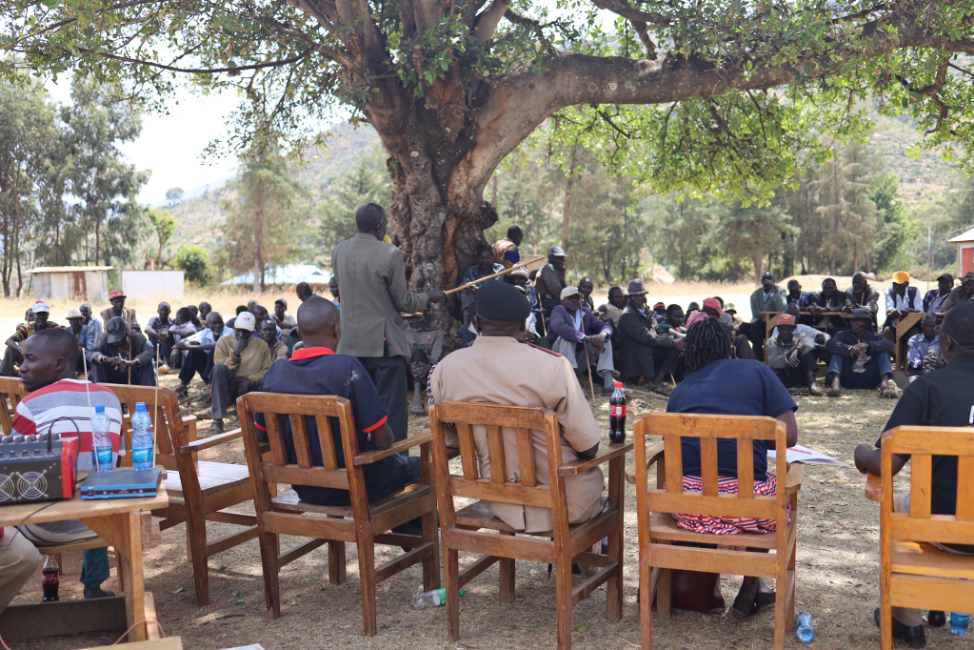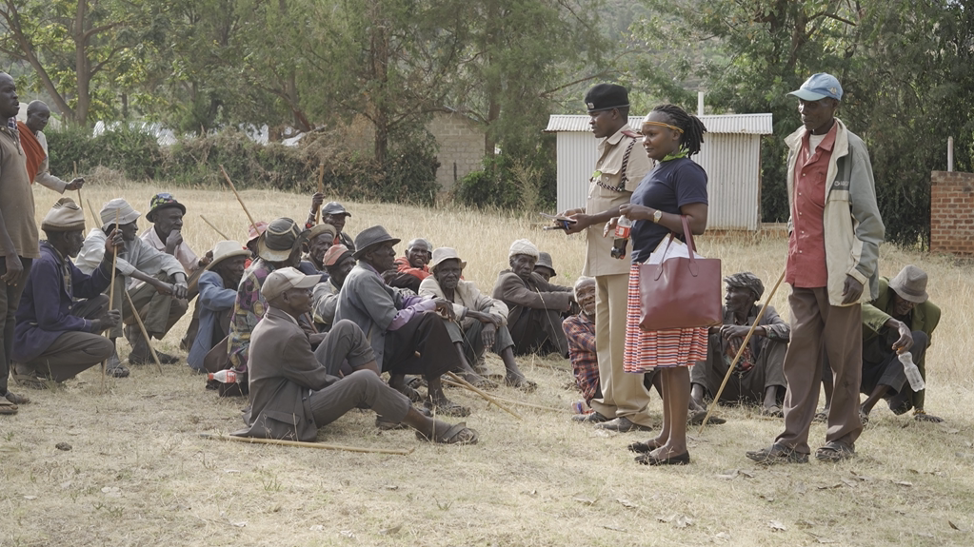The milestone is an outcome of close to ten months of community engagement and empowerment of a local anti-FGM steering committee to trace, document and report potential FGM cases in their neighbourhood.

Elders in Chepkokogh Location, West Pokot County, with the I-Rep Foundation team and local authorities during the inaugural elder’s forum in February 2023. © JHRKenya.
1 December 2023: Harnessing the power of community-led advocacy, the Chepkokogh anti-FGM Steering Committee in the County of West Pokot is breaking new ground with each passing day. From organizing groups and individual outreaches to realizing a future free from FGM in their community, courage defines their milestones. Since JHR supported their training in June 2023, their efforts recently culminated in 120 girls successfully graduating with skills on alternative rites of passage following a weeklong safe camp. This training focused on helping girls understand their Sexual and Reproductive Health Rights (SRHR), forms and manifestations of Gender Based Violence (GBV), life skills as teenagers, and use of Mass Media, among others, to promote self-awareness. The learners also gained knowledge on human rights principles, child protection and safeguarding, healthcare, HIV/AIDS, personal hygiene, and contraceptive use.
The anti-FGM steering committee training was a result of the inaugural convening with over 150 elders in February, who made a public declaration to end the practice.
The graduation ceremony organized by the I-Rep Foundation, with the support of Journalists for Human Rights, saw a renowned circumciser publicly denounce her trade and commit to championing the rights of girls at risk of undergoing the cut. This is a huge win for girls and women, considering the deeply entrenched patriarchal structures that continue to deny the Pokot girls a chance at education.
Recognizing the power of education in uplifting their socioeconomic status, the graduates implored the cutters to spare them the knife. They took the opportunity to pass a message to would-be cutters that they were on their own and would have to answer to authorities. Speaking to the girls ahead of their graduation ceremony, the committee members resolved to continue leveraging their cultural knowledge of the community to respond to emerging threats.
Reuben Baraka, the Committee chairperson is optimistic of a brighter, safer future for the Pokot girl. “In collaboration with I-Rep Foundation members, we are making sure that in the near future, our location will not experience FGM cases anymore,” he says, adding, “Since we were trained on the effects of FGM on our girls and young women, we’re identifying those still practicing FGM and teaching them about the effects of FGM without threats.”

Training of End FGM Steering Committee in Chepkokogh Location, West-Pokot County. © JHRKenya.
I-Rep Executive Director Domtila Chesang emphasized the power of community-led advocacy to end FGM and other social ills affecting women and girls at the grassroots. “The only way we can end FGM is to give power to the community themselves,” she says, adding, “We must be able to reach out to the people living in the very remote areas with limited connectivity and poor infrastructure. If we all embrace this approach of empowering the communities, then we are closing the gap in ending FGM.”

Domtila Chesang, Founder and Executive Director, I-Rep Foundation addressing elders. © JHRKenya.
Elaborating on JHR’s approach to amplifying marginalized voices, JHR-Kenya Project Coordinator Benard Ogoi observed that communities often have local solutions to the challenges affecting them. “We are committed to empowering local stakeholders with skills in documentation, knowledge management and effective communications to enable them to lead the campaigns, with a focus on amplifying the voices of women and girls through community media outlets,” he said.
FGM prevalence in Kenya currently stands at 15 percent, according to the 2022 Kenya Demographic and Health Survey. This is a drop from 21 percent reported in 2014. Girls in the County of West Pokot make up 44 percent of circumcision prevalence, significantly impacting negatively their education as well as access to Sexual and Reproductive Health and Rights.
Given the multi-faceted nature of SRHR challenges affecting girls in pastoral communities, the safe camp was designed to enable girls to understand the different facets of their lives and the attendant risks they’re likely to experience.
The event brought together government officials and local human rights defenders to commemorate the 16 days of activism against Gender Based Violence.


